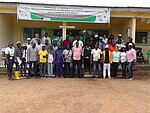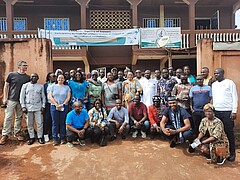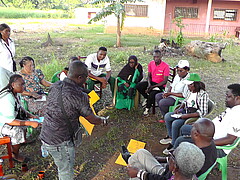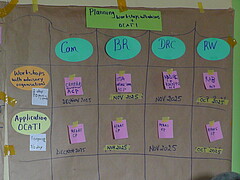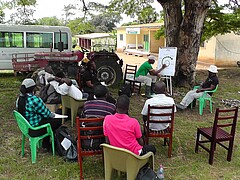CANALLS Training of Trainers in Cameroon – Empowering Advisors for Agroecological Transformation [25.08.25]
From May 21st to 25th, 2025, the CANALLS project reached an important milestone with the first Training of Trainers (ToT) programme, hosted at the Agroecology Living Labs (ALLs) in Cameroon. Bringing together more than 30 participants and 7 co-facilitators, the intensive five-day training aimed to equip participants with the skills, tools, and mindset needed to advance the adoption of agroecological practices across Africa.Organized by the University of Hohenheim and the African Forum for Agricultural Advisory Services (AFAAS), in collaboration with Cameroon partners CAMFAAS, IRAD, IITA, and SCOOPMAN, the training embodied the project’s spirit of co-creation. Representing our institution, Dr. Beatriz Herrera and Dr. Hycenth Tim Ndah played an active role in leading, guiding, and facilitating sessions.
The programme combined theory with practice, ensuring participants were not only informed but also empowered to act. By the end of the week, participants were prepared to train extension agents, conduct and analyze agroecological diagnostics, apply CANALLS methodologies and decision support tools, and co-design strategies for dissemination within their organizations. The week was structured as follows:
Day 1 focused on sharing experiences in advisory services and reflecting on the role of innovation in agroecology, setting a foundation of openness.
Day 2 deepened participants’ understanding of participatory extension methods. Participants designed and executed advisory sessions for farmer groups followed by peer feedback on the effectiveness of each methodology
Day 3 stood out with the international cross-visit, where participants engaged directly with farmers in Ntui’s ALL, observed agroecological practices in cocoa production, and shared findings during a symposium with stakeholders.
Day 4 was dedicated to hands-on work and the validation of the CANALLS decision support tool. Our department is proud to have played a significant role in its development. The day also emphasized report generation and gathering valuable feedback.
Day 5 brought the training to a close with replication planning, where each country team presented concrete strategies for embedding lessons learned into their advisory systems. The week ended with a certificate ceremony recognizing participants’ commitment and readiness to promote agroecological transformation.
Overall, the Training of Trainers programme left participants inspired and equipped to catalyze change. It highlighted the importance of capacity-building and shared learning in advancing agroecology and set the stage for the next phase of CANALLS activities.

